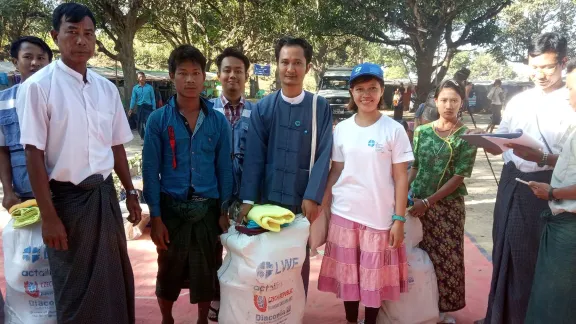
In Rakhine State, Myanmar, residents fleeing recurring fighting in Kyauktaw township have sought refuge in Ponnagyun township. The LWF and the Department of Disaster Management recently distributed non-food items including kitchen utensils, clothes, mats, water filters and mosquito nets to displaced families. Photo: LWF Myanmar
95,000 people in conflict areas can no longer access basic services
(LWI) - The Lutheran World Federation (LWF) has joined international non-governmental organizations (INGOs) renewing calls for protection of civilians amid continuing fighting between two armed sides in Myanmar’s Rakhine province.
“This conflict is causing civilian casualties, displacing communities, and worsening the already precarious humanitarian situation in central and northern Rakhine State,” the INGOs said in a statement issued on 1 April. Reiterating a similar appeal in January, the 16 international organizations “urge all parties to the conflict to ensure the protection of civilians in compliance with international humanitarian law and human rights law.”
They emphasized that newly imposed government restrictions are affecting not only access to five key townships in need of humanitarian and development assistance but also to rural areas. At least 95,000 people in the conflict affected areas can no longer access basic and essential services, they noted.
Health care services, education and access to clean water have all been jeopardized. Livelihood programs, agricultural support and other development efforts have also been suspended, impacting the food security and wellbeing of these communities.
“Health care services, education and access to clean water have all been jeopardized. Livelihood programs, agricultural support and other development efforts have also been suspended, impacting the food security and wellbeing of these communities,” they said.
Some emergency assistance for displaced populations continue but significant gaps remain, according to the INGOs. They urged the government to grant local and international organizations “rapid, unfettered and sustained access to all affected populations to independently assess needs and provide comprehensive assistance and protection to all communities in accordance with international humanitarian principles.”
While acknowledging the government’s effort in ensuring the safety of those carrying out development and humanitarian work in the affected areas, the organizations said the security situation in Rakhine warrants a different approach. “A blanket security approach for entire townships deprives populations in need of assistance and basic services,” they added.
LWF Myanmar
LWF began working in Myanmar in 2008, responding to the devastation caused by Cyclone Nargis. The country program currently implements humanitarian and development work centered on displaced populations and host communities. This includes greater access to quality education, water, sanitation and hygiene. Using an approach that strengthens people’s capacity to advocate for their own rights, the LWF also caters to health needs, sustainable livelihood opportunities and other social services, and promotes close collaboration between government agencies and the community. In 2018, the country program assisted over 150,000 people.
The LWF is also present in the country through four member churches.


